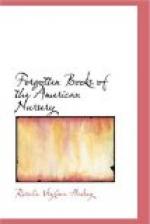Loyalist children had an almost equal supply of satirical verse to fling back at neighbors’ families, where in country districts some farms were still occupied by sympathizers with Great Britain. A vigorous example of this style of warfare is quoted by Mr. Tyler in his “Literature of the American Revolution,” and which, written in seventeen hundred and seventy-six, is entitled “The Congress.” It begins:
“These hardy knaves and stupid
fools,
Some apish and pragmatic mules,
Some servile acquiescing tools,—
These, these compose the Congress!"[98-B]
Or, again, such taunts over the general poverty of the land and character of the army as were made in a ballad called “The Rebels” by a Loyalist officer:
“With loud peals of laughter,
your sides,
Sirs, would crack,
To see General Convict and
Colonel Shoe-black,
With their hunting-shirts
and rifle-guns,
See Cobblers and quacks, rebel
priests and the like,
Pettifoggers and barbers,
with sword and with pike.”
Those Loyalists who lived through this exciting period in America’s history bore their full share in the heavy personal misfortunes of their political party. The hatred felt toward such colonials as were true to the king has until recently hardly subsided sufficiently to permit any sympathy with the hardships they suffered. Driven from their homes, crowded together in those places occupied by the English, or exiled to England or Halifax, these faithful subjects had also to undergo separation of families perhaps never again united.
Such a Loyalist was James Murray. Forced to leave his daughter and grandchildren in Boston with a sister, he took ship for Halifax to seek a living. There, amid the pressing anxieties occasioned by this separation, he strove to reestablish himself, and sent from time to time such articles as he felt were necessary for their welfare. Thus he writes a memorandum of articles sent in seventeen hundred and eighty by “Mr. Bean’s Cartel to Miss Betsy Murray:—viz: Everlasting 4 yards; binding 1 piece, Nankeen 4-7/8 yards. Of Gingham 2 gown patterns; 2 pairs red shoes from A.E.C. for boys, Jack and Ralph, a parcel—to Mrs. Brigden, 1 pair silk shoes and some flowers—Arthur’s Geographical Grammar,—Locke on Education,—5 children’s books,” etc. And in return he is informed that “Charlotte goes to dancing and writing school, improves apace and grows tall. Betsy and Charles are much better but not well. The rest of the children are in good health, desiring their duty to their Uncle and Aunt Inman, and thanks for their cake and gloves.”
To such families the end of the war meant either the necessity for making permanent their residence in the British dominion, or of bearing both outspoken and silent scorn in the new Republic.
For the Americans the peace of Yorktown brought joy, but new beginnings had also to be made. Farms had been laid waste, or had suffered from lack of men to cultivate them; industries were almost at a standstill from want of material and laborers. Still the people had the splendid compensation of freedom with victory, and men went sturdily back to their homes to take up as far as possible their various occupations.




